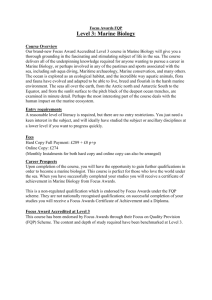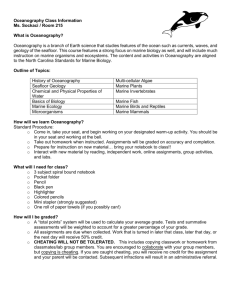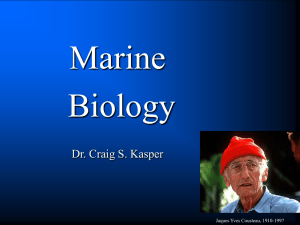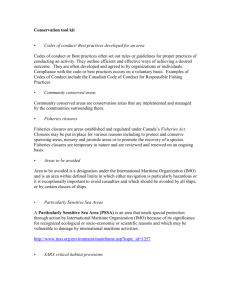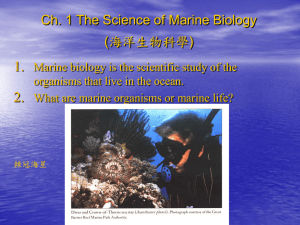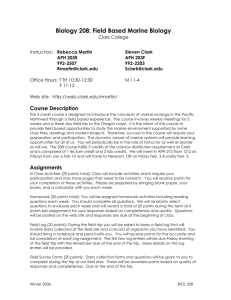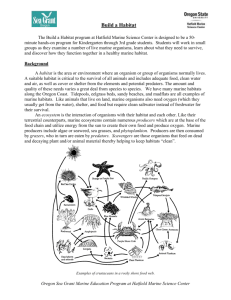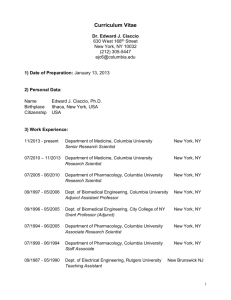BIOL 4280 (Ciacio) - Dixie State University
advertisement
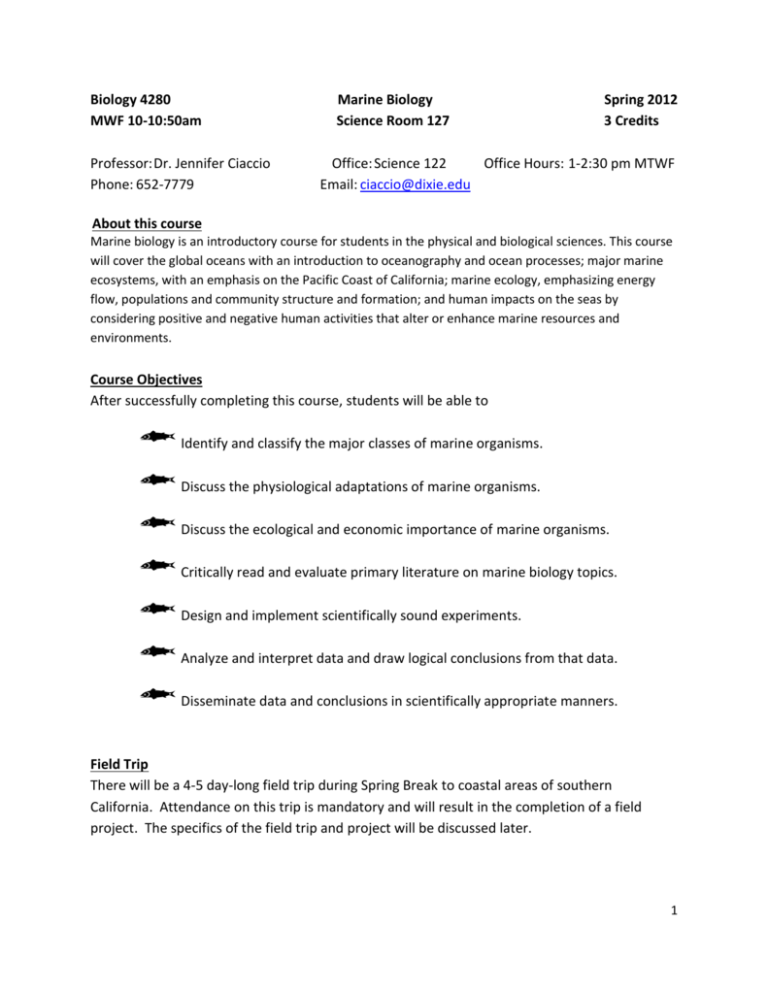
Biology 4280 MWF 10-10:50am Professor: Dr. Jennifer Ciaccio Phone: 652-7779 Marine Biology Science Room 127 Spring 2012 3 Credits Office: Science 122 Office Hours: 1-2:30 pm MTWF Email: ciaccio@dixie.edu About this course Marine biology is an introductory course for students in the physical and biological sciences. This course will cover the global oceans with an introduction to oceanography and ocean processes; major marine ecosystems, with an emphasis on the Pacific Coast of California; marine ecology, emphasizing energy flow, populations and community structure and formation; and human impacts on the seas by considering positive and negative human activities that alter or enhance marine resources and environments. Course Objectives After successfully completing this course, students will be able to Identify and classify the major classes of marine organisms. Discuss the physiological adaptations of marine organisms. Discuss the ecological and economic importance of marine organisms. Critically read and evaluate primary literature on marine biology topics. Design and implement scientifically sound experiments. Analyze and interpret data and draw logical conclusions from that data. Disseminate data and conclusions in scientifically appropriate manners. Field Trip There will be a 4-5 day-long field trip during Spring Break to coastal areas of southern California. Attendance on this trip is mandatory and will result in the completion of a field project. The specifics of the field trip and project will be discussed later. 1 Grading Policy You may expect the following grade based on percent of points earned: A = 93-100% B = 83-86.9% C = 73-76.9% A- = 90-92.9% B-= 80-82.9% C- = 70-72.9% B+=87-89.9% C+=77-79.9% D+ = 67-69.9% D = 63-66.9% D-= 60-62.9% F= 0-59.9% Graded Assignments Presentation --------------------------------------------------------------------------------------------- 100 Discussion Leading-------------------------------------------------------------------------------------- 100 In-Class Discussion Participation -------------------------------------------------------------------- 200 On-line Discussion Threads --------------------------------------------------------------------------- 200 Topic Review Paper------------------------------------------------------------------------------------- 100 Field Project ---------------------------------------------------------------------------------------------- 100 Final (Experiment) -------------------------------------------------------------------------------------- 100 Total-------------------------------------------------------------------------------------------------------- 900 Presentation Each student will be responsible for giving one 10-15 minute powerpoint presentation on their assigned topic. An outline for the topic will be supplied at least one week prior to the presentation’s scheduled date. Presentations are expected to be concise, clear, and informative. The first few topics will be covered by Dr. Ciaccio as a model. Journal Articles and In-Class Discussions There will be daily primary source readings that each student will be expected to intelligently discuss during class. A recent experimental paper will be chosen by the student Discussion Leader. The Discussion Leader is expected to choose an appropriate experimental paper to discuss, understand the chosen article, and lead the discussion by encouraging participation by asking others their thoughts, opinions, etc. The Discussion Leader should not monopolize the discussion, but should ensure that the discussion is not being monopolized by others and should give everyone a chance to participate. Participation by class members in discussions will be graded. On- line Discussion Threads On the first day of class, each student will be assigned groups of marine organisms to research. Each week, three topics are discussed in class. The Friday prior to the discussions of these topics, students will post information to a discussion thread on blackboard pertaining to how the topics at hand relates to their organism. Information about organism can come from any credible source (texts, journal articles, college or government websites, etc.) and must be cited. 2 In addition, prior to class, students must review all other postings and comment intelligently on at least two other students’ posting (as well as answering any questions posted to their thread). Topic Review Paper Students will be assigned a topic in the beginning of the semester. They will write a 5-7 page paper (double spaced, 10-12 pt. font, 1 inch margins all around, not including references) on the topic using only scientific journal articles as source material (at least 10). The paper will either be an overview of how the topic relates to many different types of fish or a very detailed review of one type of fish. The paper is due on October 31. Students needing Accommodations If you suspect or are aware that you have a disability that may affect your success in the course you are strongly encouraged to contact the Disability Resource Center (DRC) located in the North Plaza Building. The disability will be evaluated and eligible students will receive assistance in obtaining reasonable accommodations. Phone # 435-652-7516 College Withdrawal Policy Students may drop or audit courses through January 31st without receiving a “W.” Dropping after this time requires approval from the Academic Appeals Committee (forms available in the Advisement Office). Library Services Students will be oriented during a scheduled class period about the available services. For help, see assignment guide at: http://library.dixie.edu/courses/subjectguides.html Writing Center See the on-line writing center at: http://dsc.dixie.edu/owl/. We will review the citation style to be used for papers in class. Students are warned that plagiarism results in a failing grade “F” for the entire course (if you are unsure what constitutes plagiarism, go to: http://dsc.dixie.edu/owl/ or see: http://www.utoronto.ca/writing/plagsep.html ) Tutoring Center Drop-In Tutoring allows students to work on assignments independently while having the opportunity to have tutor assistance when needed. Peer tutors are available Monday through Friday during designated hours. Students are encouraged to visit the Tutoring Center to pick up a Drop-In Tutoring Schedule that lists specific times and subjects. (Check the Drop-In Schedule regularly because times and subjects offered may change during the course of a semester.) Each time you come in for Drop-In Tutoring, you must present a valid Dixie State College 3 student identification card to the receptionist. The receptionist will sign you in and keep your card until you leave the Tutoring Center. Academic integrity Plagiarism, or claiming the work of others as your own, is considered cheating. Furthermore if a student is observed looking on another student’s exam, quiz or assignment; talking to another student during an exam or quiz; using notes or books not authorized for use during an exam or quiz; or in any other manner not observing the “code of conduct” as written in the Dixie College catalog, disciplinary action will be undertaken. For the following course policies, exceptions are subject to the instructor’s discretion: If a student is participating in a Dixie State College Official event that conflicts with the schedule, they must see the instructor IN ADVANCE of their missing the deadlines to arrange alternative dates. You are in college and will be respected as an adult. Disruption or other discipline problems are not tolerated; any person not respecting the rest of the class will be removed. It is expected that students will attend each class period. 4 Tentative Schedule Date 01/09 01/11 01/13 01/16 01/18 01/20 01/23 01/25 01/27 01/30 02/01 02/03 02/13 02/15 02/17 02/20 02/22 02/24 02/27 02/29 03/02 03/05 03/07 03/09 03/12 03/14 03/16 03/19 03/21 03/23 03/26 03/28 03/30 04/02 04/04 04/06 04/09 04/11 04/13 04/16 04/18 04/20 04/23 04/25 04/30 Topic Introduction Library Library Martin Luther King Day - off Form Locomotion Respiration Circulation Osmoregulation Buoyancy Reproduction Mating Systems Dispersal Larval Settlement Movement and Migration President’s Day - off Visual Communication Chemical Communication Foraging Predation Antipredator Adaptations Parasitism Mutualism Review for Field Trip Spring Break – Field Trip Food Webs and Trophic Relationships Nutrient and Energy Flow Pelagic Habitat Benthic Habitat Coral Reef Habitat Intertidal Habitat Estuaries Abyssal Habitat Pollution Global Climate Change Fisheries and Fisheries Management Experiment Final 5



